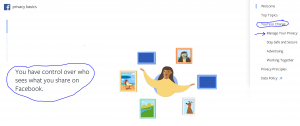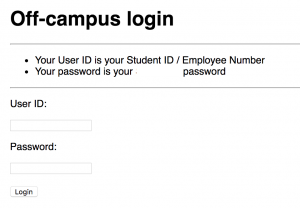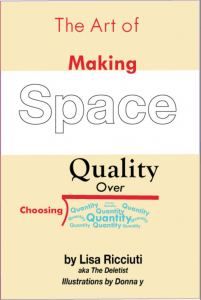I have to admit that I was quite amused at the content on Facebook’s Privacy Basics page. The phrase “You’re in Control” is even one of the menu headers. Really? I thought to myself. I never feel in control of my content on Facebook (FB) which is one of the primary reasons why I never use the account I’ve had for about 10 years. I only have content because my friends occasionally tag me in a photo or comment on something with my name.

It’s true that I can control who sees what I share on Facebook, but I can’t control what other people share or post about me. That becomes part of their feed and record. I know that I can be notified if someone tags me in a photo that s/he posted. If I elect not to be tagged, that photo is still there. That image of me can still be found with facial recognition software on someone else’s post even if it’s not tagged with my name and even after I’ve deleted my account. Where’s the control?
I’m irritated every time FB updates their privacy settings, that are inevitably defaulted to grant the highest level of access possible to my information. This means each time an update occurs, I have to go in and reset my permissions to whatever is the most restrictive.
I understand that Facebook now is quite different from the one I joined in 2007. From its inception, it’s always been focused on sharing with others. The result is volumes of information freely available with open access. I’m not surprised to see FB in the headlines for months now about how data harvested from the site was used to influence voters and sway elections. I’m only surprised that it took so long to come out in the open.
Facebook’s business model is based on using profile information to send sponsored advertisements to their targeted audience. Does Zuckerberg have so little imagination that he couldn’t possibly imagine anybody using profile data to do anything else, like manipulate a government election? Hasn’t he read any sci-fi books about this? I’ve been reading about it in post-apocalyptic young adult novels for years. Surely some of these themes have hit the adult market.
So why do I keep my account? Like many people it’s because certain things I do are only on FB. Very annoying.


